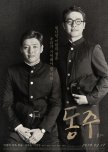Dong Ju: The Portrait of a Poet is an eloquent story woven around the poet's own insightful words. Shot in black and white, the monochrome film beautifully fits the quiet, intense mood of the short lives of these two young men.
I will leave the historical aspect of this film to those who have a personal stake in it or are more well versed in it than I am.
This film is as much about Yun Dong Ju's cousin and revolutionary, Song Mong Gyu, as it is the poet. Their lives are intertwined, two different ideals in how to resist during a time of hated occupation. One willing to use a gun, the other a pen though at times those lines blur. Their friendship though challenged never waivers.
The story begins and ends with the young men in prison. The present takes place during Yun's interrogation by the Japanese. As Yun is questioned, the past is revealed to show the steps they took to end up in prison. Quoting Yun's poetry to the corresponding events paints the conflicted feelings he had over his role during the dark times and his attempt to find hope in the moment. The tripod of present, past and poetry is perfectly balanced.
Kang Ha Neul gives a restrained and poignant performance as Yun's younger self and later as the tortured prisoner knowing death is imminent, reflecting on his actions and inactions. All the performances are good but his stood out as the titular character.
Dong Ju is an elegantly filmed story of an inelegant and agonizing time told through the courage, defiance and beauty of poetry and a poet.
Prelude
Wishing not to have
so much as a speck of shame
toward heaven until the day I die,
I suffered, even when the wind stirred the leaves.
With my heart singing to the stars,
I shall love all things that are dying.
And I must walk the road
that has been given to me.
Tonight, again, the stars are
brushed by the wind.
-Yun Dong Ju
Esta resenha foi útil para você?

 55
55 202
202 11
11























